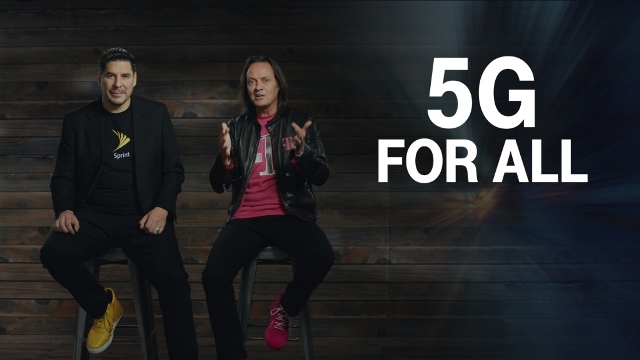
T-Mobile US has announced its decision to acquire smaller rival Sprint, a SoftBank-owned operator, for $26 billion as part of the strategy to accelerate 5G deployment and technology innovation.
The all-stock deal will combine the third and fourth largest U.S. wireless carriers and is expected to attract regulatory scrutiny over its impact on mobile consumers. Verizon and AT&T are the number one and two telecom operators in the U.S.
The agreement indicates that SoftBank CEO Masayoshi Son, who invests billions in new markets including India and segments, has given up dreams about the US telecom market due to competition from T-Mobile, a company owned by Germany’s Deutsche Telekom.
This deal represents an implied enterprise value of $59 billion for Sprint and $146 billion for the combined company. The combined company will be named T-Mobile. Sprint and T-Mobile will benefit from their spectrum holdings, resulting network scale, and expected run rate cost synergies of $6+ billion.
The agreement will be setting the stage for the creation of a telecom carrier with 127 million customers that will be a more formidable competitor to Verizon Communications and AT&T Inc.
New investment
T-Mobile deployed LTE twice as fast as Verizon and three times faster than AT&T, and the combined company is positioned to do the same in 5G with deep spectrum assets and network capacity.
T-Mobile said the new T-Mobile will employ more employees as compared to the total employee base of Sprint and T-Mobile.
More than 200,000 people will work on behalf of the combined company in the U.S. at the start. New T-Mobile plans to invest up to $40 billion in its new network and business in the first three years alone. This is 46 percent more than T-Mobile and Sprint spent combined in the past three years.
This combination will also force AT&T, Charter, Comcast, Verizon, and others to make investments of their own to compete, driving billions more in accelerated investment.
The headquarters of the new company will be in Bellevue, Washington, with a second headquarters in Overland Park, Kan.
Deutsche Telekom and SoftBank Group are expected to hold approximately 42 percent and 27 percent stake.
The new company will have some of the most iconic brands in wireless – T-Mobile, Sprint, MetroPCS, Boost Mobile, Virgin Mobile – and will determine brand strategy after the transaction closes
John Legere, current president and chief executive officer of T-Mobile US, will serve as chief executive officer, and Mike Sievert, current chief operating officer of T-Mobile, will serve as president and chief operating officer of the combined company.
Tim Hottges, current T-Mobile US Chairman of the Board, will serve as chairman of the Board for the new company. Masayoshi Son, current SoftBank Group Chairman and CEO, and Marcelo Claure, current chief executive officer of Sprint, will serve on the board of the new company.
Regulator challenges
The development assumes significance because U.S. regulators have challenged in court AT&T’s $85 billion deal to buy U.S. media company Time Warner. Sprint and T-Mobile will also face scrutiny on how they will price their combined wireless offerings.
T-Mobile majority-owner Deutsche Telekom and Japan’s SoftBank Group, which controls Sprint, agreed on a structure that will allow Deutsche Telekom to continue to consolidate the combined company, which will have a market value of over $80 billion, on its books.
Deutsche Telekom will own 42 percent of the combined company, and will control the board of the combined company, nominating nine of the 14 directors.
Sprint’s and T-Mobile’s first round of merger talks ended in 2014 after U.S. President Barack Obama’s administration expressed antitrust concerns about the deal, Reuters reported.
The U.S. government has already opened a probe into alleged coordination by AT&T, Verizon and GSMA, a telecommunications standards organization, to hinder consumers from easily switching wireless carriers.
The second round of talks between Sprint and T-Mobile ended in November over valuation disagreements.
Since then, Sprint’s shares lost about a fifth of their value amid questions about how the company can compete effectively under the weight of its long-term debt of more than $32 billion.
Softbank has been looking to trim its own debt as well, which reached $147 billion as of the end of December. It has said it is planning to raise cash by taking its Japanese mobile phone unit public this year.
Failure to clinch a deal last November left SoftBank CEO Masayoshi Son, a dealmaker who raised close to $100 billion for his Vision Fund to invest in technology companies, in search of other options for Sprint.
Even though Sprint’s customer base has expanded under CEO Marcelo Claure, growth has been driven by discounting. Without T-Mobile, Sprint lacks the scale needed to invest in its network and to compete in a saturated market.
T-Mobile has fared better than Sprint, even if it remains a distant third to Verizon and AT&T. T-Mobile managed to score sustained market share gains, as innovative offerings, improving network performance and good customer service attract new customers.
T-Mobile became the first major U.S. carrier to eliminate two-year contracts, a shift quickly embraced by consumers and copied by competitors. The company has also badgered rivals with its unlimited data plans.
Both Sprint and T-Mobile are far behind Verizon and AT&T in upgrading their network to accommodate 5G wireless technology. The combined company’s budget to invest in 5G will be smaller than Verizon or AT&T’s.
Sprint and T-Mobile hope the deal will give them more firepower to participate in auction for spectrum to develop 5G. They plan to participate in a spectrum auction in late fall.
